- Home
- Lidia Yuknavitch
Verge Page 2
Verge Read online
Page 2
Kiril’s favorite game was to snatch and hide Goodall, the stuffed monkey. Over time Anastasia grew expert at finding the object quickly by imagining a question: What would a boy whose boyhood has been taken from him do with a beloved object, having never been beloved himself? His hiding places were obvious, sometimes even a bit sad.
But one day something quite different happened to Goodall. As Anastasia was hunting for him, peering under a woodshed outside the house, Kiril came around the corner holding Goodall’s arm in the air above Anastasia’s head. She lunged for the stuffed monkey but missed. Kiril laughed, and the laugh made a sound something like a child moving toward manhood. Then Kiril brought out a giant pair of metal scissors—the kind that metalsmiths used—and clipped Goodall at the wrist. As he stood there holding Goodall’s hand aloft, Kiril’s smile curled like a worm. Anastasia’s breath stuck in her throat. She ran to retrieve the handless Goodall from the mud.
Kiril held the severed hand out to Anastasia.
“You can sew it to its foot if you like.”
She lunged for the hand a second time.
Kiril put it in his mouth and swallowed it.
In her head, Anastasia repeated the names of the cosmonaut monkeys: Abrek, Bion, Verny and Gordy, Dryoma and Yerosha, Zhakonya and Zabiyaka, Krosh and Ivasha, Lapik and Multik. Then, in her head and heart, she vowed to kill Kiril.
The thought came easily to her. A transaction, no more.
Had she been able to retrieve the monkey’s hand, she thought later, she would have sewn it to the monkey’s ankle for a while before putting it back where it belonged. Proof that anything could be taken apart and put back together. Instead, she simply sutured closed the monkey’s arm at the wrist.
* * *
• • •
ON HIS FIFTEENTH BIRTHDAY, Kiril was thrown something like a party. Poverty and wealth take different shapes in a home. Children who grow up without the support of family or security can become slippery, uncertain, feral. And yet, compared to abuse or neglect or relegation to an orphanage, their life might qualify as happy.
When Kiril blew out the candles on his cake, he stood up to give a small speech. Lifting up his shirt and pulling his waistband down just a bit, he told the others of his kidney operation, delicately fingering the stitches (which looked to Anastasia like a reddish, fascinating zipper) stretching from near his belly button up toward the side of his rib cage. Then he pointed to the new icebox his kidney had paid for. The aunt smiled. The other children clapped.
Very small pieces of cake that didn’t taste like much were cut—enough to feed all seventeen of them, plus Anastasia and the aunt and some man Anastasia didn’t know. Then all the children wanted to see inside the new icebox, where frozen meats and breads and vegetables and cheese were stacked like blocks of colored ice. The icebox would change their lives. To be able to store food was to live differently. Anastasia thought briefly of Kiril’s red zipper scar, imagined reaching in and grabbing some other organ from inside him as if she were reaching in for food.
A different child, a boy of eight or so—his name might have been Yegor or maybe Iilya; Anastasia sometimes got them mixed up—then smiled and threw his hands in the air, yelling, “These hands! These hands!” Because he’d been the organ runner. For Kiril’s kidney. Anastasia stared at his hands in the air, her own deadened hand hanging down by her side.
The organ runner’s story always mesmerized the other children. The doctor (Was he a doctor?) had placed the bloody bulb of Kiril’s kidney into the organ runner’s rubber-gloved hands, and then the organ runner placed Kiril’s kidney into a picnic cooler filled with precious ice, and then the child ran and ran between houses through alleys through breaks in fencing around trash in the night to an apartment about twenty-seven minutes away (they’d timed the run again and again) and up the apartment stairs three flights and into a dark room where a woman in her sixties from Florida was lying anesthetized on a table, with another doctor (Was he a doctor?) standing by, both of them waiting for the delivery. And why child runners are best is their small size their nimbleness running through alleys and slums and refuse and detritus their not being stopped for questioning their looking like street urchins crawling the nightscape exactly as they should look. And children asking nothing just running away.
There were other stories the children told, gathered on cold nights next to the fire. When one of them asked, another would lift a loose floorboard and pull out an old article from the United States—unfolding it carefully, as if it were something to be treasured—and read aloud. They memorized individual phrases about a faraway person named Kendrick: “Died in a tragic incident at a local school.” “Smothered under a floor mat.” “Body unearthed.” “His organs removed from his body, the cavities filled with newspaper.”
Children’s lives all over the world are shaped by such tales, told or lived by adults who transgress every principle of human value. Do not get kidnapped or snatched or abandoned, they learn. Everywhere, eyes might be watching you. Your bodies are worth their weight in gold.
Kiril’s ire, and Anastasia’s hatred, hit a zenith on the night of Anastasia’s first run. She’d done the route with a handler a dozen times, always in twenty-one minutes door-to-door with an eight-minute car ride between. Once, when the driver was late at the pickup point—twenty-three minutes twenty-five minutes thirty-two minutes—she stood in an alley trying to look like stones in the wall, shifting her weight from foot to foot, and at forty-four minutes she opened the picnic cooler filled with ice and a kidney and slipped her lame hand into a blue surgical glove from her pocket, jammed it down into the ice, and started massaging the kidney. She didn’t know why she did it. She just felt that the kidney needed help. Since she had so little feeling in her hand, Anastasia was able to keep her hand in the ice all the way to their destination, even as the driver looked over the backseat saying, Your hand, your hand, isn’t that cold? Can you feel your hand? Anastasia just sat there, singing quietly to the small kidney, until they reached the apartment and the driver told the doctor (Was he a doctor?) and the husband of the recipient—a Jewish woman from New York City whose name could not be moved any higher on the transplant list due to her age—what the girl had done.
And the husband of the woman from New York sat in a chair and cried, because he knew how important the hands of children could be.
* * *
• • •
AFTER THAT the story of Anastasia massaging the kidney on its journey took on a kind of magic. People started asking for the girl who had such sacred luck with human organs. Kiril repeated the story of his kidney removal, showing off his scar, but the scar was not as interesting as it once was, and it was forgotten in favor of the story of the girl who lovingly delivered organs to grateful recipients. All over the Ukraine and Russia, people began asking for the girl organ runner as a form of good luck. A bit of hope in the dark.
The aunt and the household prospered.
Kiril left rat shit and dog droppings in Anastasia’s hole in the stone wall.
Anastasia dreamed of Kiril’s death and dismemberment.
* * *
• • •
ONE SECTION of the Jane Goodall book that imprinted on Anastasia’s brain involved her time as a secretary in a physiotherapist’s clinic. The patients there were all afflicted differently. There were babies with clubfeet, children with polio whose limbs were limp and paralyzed, teens withering away toward death from muscular dystrophy or cerebral palsy. Many of the children could not walk and would have to spend the rest of their lives in wheelchairs, or leg irons, or clumsy crutches. And then there were the children whose diseases didn’t have a name yet, who could not seem to control their muscles at all, whose arms and legs were at war with themselves. Those children were often labeled crazy and sent to mental institutions. The doctor who treated the patients shared with Jane a surprising story: Once he had told a rathe
r adult joke to a roomful of child patients at the clinic. As soon as he delivered the punch line, one patient’s eyes lit up with joy: the girl with the so-called crazy eyes. She was the only person in the room who’d understood the joke. The doctor took the girl home with him and gave her private lessons. The girl turned out to be quite brilliant, learned to talk, and passed every one of her school exams.
Anastasia believed in the secrets of girls. Maybe all girls carried them.
After that, Jane Goodall went to Africa to study chimp behavior.
Anastasia grew the beginnings of breasts.
Kiril approached sixteen years old, the age when the children were no longer children enough to stay in the house.
The week before Kiril was to leave, he caught Anastasia in an alley on her way home from selling hair. He grabbed her by the neck and held her against the wall like that. With his free hand, he unzipped his pants, grabbed her feeble hand, and said, “Do it. Massage my organ.” His mouth looked like a line cut with a knife.
For a while she didn’t move. Briefly she wondered if it was possible to rip a cock off a body with one’s bare hands. She’d once heard of a father ripping his daughter’s ear off. Then he tightened his grip around her neck and lifted her a little off the ground, to show her that he could. Her windpipe constricted. This is a stupid way to die, she thought. Silently, in her head, she repeated the names of the monkeys: Abrek, Bion, Verny and Gordy, Dryoma and Yerosha, Zhakonya and Zabiyaka, Krosh and Ivasha, Lapik and Multik. Then he put her back down on the ground and squeezed her neck until, with her unfeeling hand, she obeyed. Her eyes watered, but she stared at him, refusing to release his gaze. In the end, he was the one to look away. Then he came. Then he ran. Anastasia spit on the ground next to the semen. She looked at her hand, then wiped it on the wall, carrying a small murderous desire up her arms and into the base of her skull.
* * *
• • •
BY THE TIME Anastasia turned eighteen, she had her own crew of four girl children. The aunt, or whoever she was, had agreed to something like a franchise situation. Anastasia earned enough to rent a small apartment for them to share. They all slept in the main room together. Goodall had a position on the mantel above the fireplace.
At night, in front of the fire, Anastasia would read to the girls from Jane Goodall’s book. She read to them about how the orphaned chimps who make it to sanctuaries are lucky. About how some infant chimps are sold to animal dealers, smuggled to different countries in boxes that are too small and purposely mislabeled, often dying along the way. About how some chimps are bought to be used in zoos, or as pets for wealthy people, or are beaten with metal bars as part of their circus training. When Anastasia came to the part about medical research labs, where chimps are forced to live in tiny cages and undergo medical experiments, she’d read very slowly what Jane Goodall wrote about how chimps feel pain and fear and experience depression and most other human emotions. Now and then, as she read, one of the children would look up over the fireplace at Goodall.
Anastasia would end the stories by reminding the girls that the United States of America had retired nearly four hundred medical research chimps, many of them returned to live safely in sanctuaries. The United States, a place they all hoped to reach someday.
One afternoon Anastasia was called on a special mission that required herself and one other girl. The organ donation was a kidney—that was not so unusual—but the donor would also be donating a piece of liver for a different patient, and thus a second organ runner would be needed, to be sent off in another direction. In addition, the donor would need some kind of special care for twenty-four hours—just observation, they promised—but a kind of body sitter for a night and a day. The price was unusually good. The recipient, who was from Miami, Florida, had asked for Anastasia specifically.
When she arrived, Anastasia knew that something was not quite right. She could feel it in her neck and spine. The building had no other inhabitants; the stairwell lights were burned out, and the wooden walls smelled moldy and putrid. A voice at the stop of the stairs said, “Come.” Anastasia paused, but she knew the money was enough to get the two of them more than a refrigerator or stove. It might get them out forever. With her strong hand, she took the other girl’s arm. With her feeble hand, she fingered a knife strapped to the outside of her leg, underneath her dress.
At the door at the top of the stairs, a woman ushered them into the main room of a dark and rotting apartment and then into a bedroom. In the bedroom were a bed, a dim-bulbed lamp, a man standing there with surgical gloves and a tray of operating items, the organ recipient on the bed prepped and sedated, and a cage of the size one might need for a wild animal.
Inside the cage was Kiril.
Anastasia did not blink. She let go of the girl and said, “Where is the donor?”
“There,” said the man who would perform the surgery, pointing to the cage. The woman said something in Ukrainian, some kind of warning.
Anastasia stepped closer to the cage. It did not take long for her to see that Kiril had been beaten. Badly. One of his eyes was swollen shut. He held one arm bent against his body like a broken wing. His mouth was bleeding. When he looked up, she could not tell if he recognized her. He made a sound like an animal in danger or a person whose wits had left him. Not a bellow, not a whimper, but something in between.
What she knew was that Kiril had only one kidney.
What she knew was that removing the other would kill him.
Kiril had been captured, it was clear. In this room, his worth was less than nothing. Whatever money—that thing more valuable than a body, or a people, or a nation—had changed hands was worth more than the life of one homeless creature in this newsless, powerless, invisible country.
She looked at her own hand. The feeble one. The one they expected her to use to preserve a human organ before it was sewn into a foreign body from some other world.
She reached out to Kiril in the cage. He put his face against the metal. She touched his skin with the back of her feeble hand. He whimpered.
Kiril would die, but not by her hand.
Or he would die by all of our hands.
When Jane Goodall saw Louis Leakey discover his first ape skull during an archaeological dig, she thought about how that ape had stood right where they were standing, had felt the air on its skin and the sun and the good dirt—how the ape had inhabited the same world in the same spot, as if time and evolution were nothing. It existed, and then it did not.
Anastasia thought of all the girls in the world who make transactions toward life away from death, buying time, buying hope, buying a chance or a way out. She thought about all the boys with the power to stop them with a hand to the throat, or with a dollar or a whispered word. She thought about Jane Goodall, and Africa, and how some monkeys were released into sanctuaries and others were beaten and tortured and others were shot into space. She thought about the United States, those weird and deformed so-called states stitched together from a brutal and bloody beginning, still straining against their sutures, like a hand sewn too close to a foot. How do any of us evolve, she wondered, from out of all this?
“I’m ready,” she said.
STREET WALKER
First thing in the morning, when I take out the trash, I see it: syringe on the lawn. Still bloody. It spikes and chills my memory: four long years of youth sliding cold silver glint into waiting blue.
My neighborhood is turning. It’s not dramatic, it’s no more or less real than TV, than other places I have lived, all those little white-lined streets. We can posture as a nation of shock all we want. It’s still a story we know: Somebody wants something more than their own life. Somebody else is terrified by all that they want.
It’s not possible, in my neighborhood, to tell who has money enough to live on and who does not, though it’s clear that no one is wealthy. Old two- and three-story homes buil
t in the early 1900s, with questionable roofs and overstuffed leaf gutters. Ours a sort of bohemian-looking hippie haven, both inside and out: overgrown garden, cracked eaves, front porch step rotting away. The rest of our street dotted with flat ramblers, faux-stone façades, additions tacked onto additions like berserk extra appendages. One of the houses has been graced with a concrete lion. So regal! Covered in moss and bird shit.
Nor is it possible to tell who is liberal or who is conservative or nuts or brilliant or a criminal or a good citizen. All the façades need new coats of paint, all the yards need care. Even our fences are leaning toward giving up. The spaces between houses hold their secrets: overflowing trash cans and piles of broken flowerpots, garden hoses all snarled up and molding, our efforts at beautiful landscaping creating their own ridiculous labyrinths between our homes. I’ve noticed that my neighbor Clark and I both wear sweatpants and sneakers after five and on weekends. Clark may be an alt-righter; he may be just a guy who lives in his mother’s basement. In our Nike uniforms, who can tell?
In our hearts we meant to complete all the projects, spiff up our neighborhood, improve our homes and selves. In reality we’re too fucking tired from too many jobs or kids or just the idea that nothing turned out the way we dreamed it would. Our sad little dream balloons, once swollen with hot air, deflating slowly like my aging breasts.
On the other hand, money isn’t what makes our houses homes.
For example, instead of filling my house with things that cost money, I’ve filled it with things that comfort me: Plates and bowls filled with rocks and feathers and the small bones of animals. Cups with azure beads. Seashells and talismans and trinkets. And books. More books than you can possibly imagine. Books in every room, shelved, on tables, in stacks on the floor.

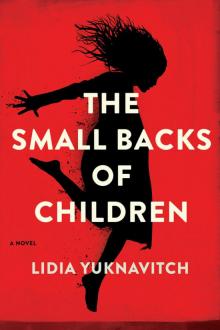 The Small Backs of Children
The Small Backs of Children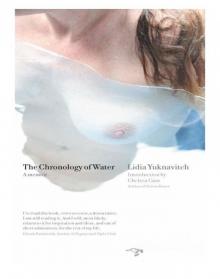 The Chronology of Water
The Chronology of Water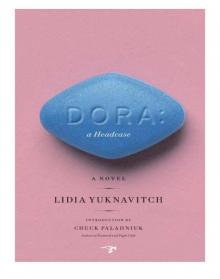 Dora: A Headcase
Dora: A Headcase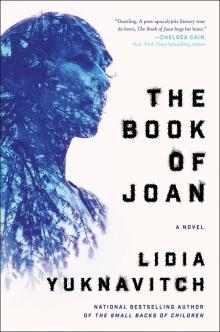 The Book of Joan
The Book of Joan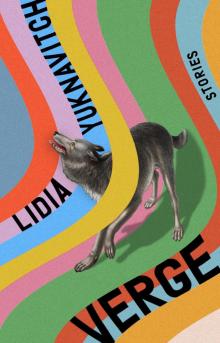 Verge
Verge